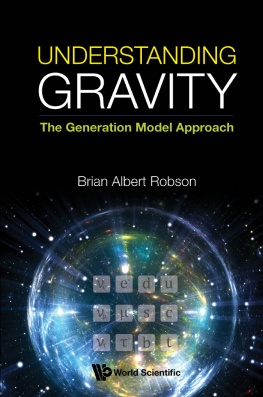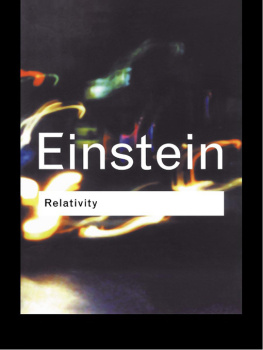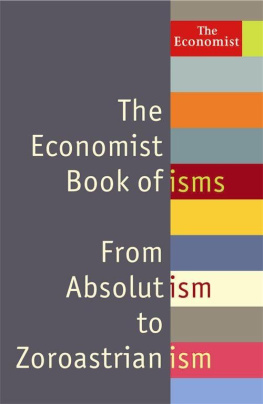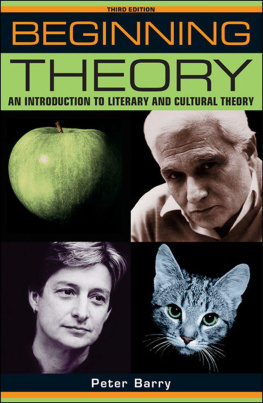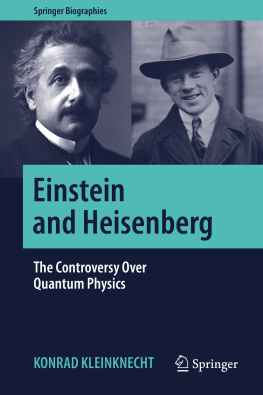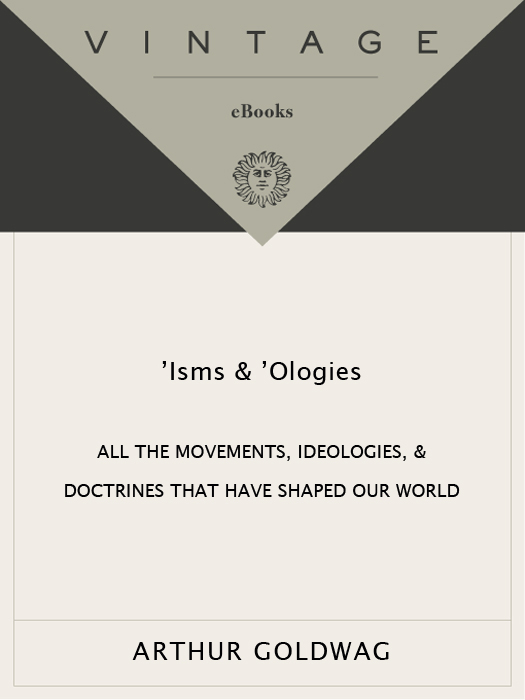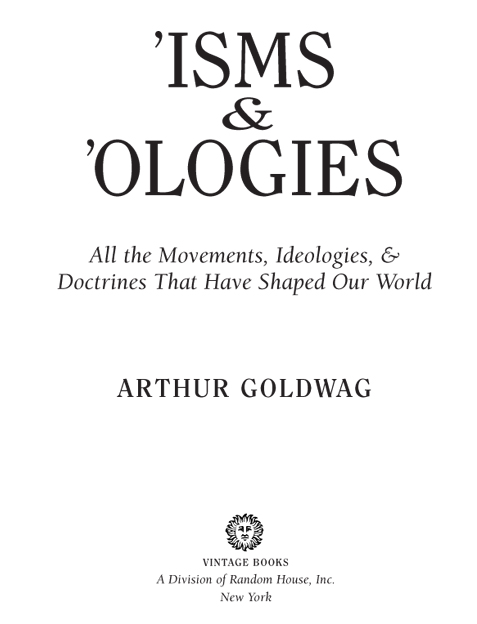Arthur Goldwag is a freelance writer and editor who lives in Brooklyn, New York. He is the author of The Beliefnet Guide to Kabbalah.
All rights reserved. Published in the United States by Vintage Books, a division of Random House, Inc., New York, and in Canada by Random House of Canada Limited, Toronto. Originally published in hardcover in the United States by Madison Park Press, New York, in 2007.
Vintage and colophon are registered trademarks of Random House, Inc.
Goldwag, Arthur.
Isms and ologies : all the movements, ideologies and doctrines that have shaped our world / by Arthur Goldwag.
1st ed.
p. cm.
978-0-307-27907-1
1. SociologyDictionaries. 2. IdeologyDictionaries. 3. Learning and scholarshipDictionaries. 4. English languageTerms and phrases.
HM585 .G655 2007
301.03 22
20070233131
ALPHABETICAL LIST OF TERMS

Introductionism
by Michael Lewis
n. An obscure cult inside American publishing devoted to finding people willing to praise new books, typically written by their friends. In the ideal case the author of the book is a complete unknown, whereas the writer of the introduction is slightly less obscure, and deeply in debt not only to the author but also to the publishing house. The cults single sacred belief is that any new book, no matter how ineptly written, can be sold with the right sales pitch.
If that is a fair definition of introductionism, this introduction counts as heresy. Id never heard of the author, Arthur Goldwag, and his book was sent to me by a publisher to whom I owe nothing at all. This manuscript, with its odd title, just arrived in the mail, and I started to read it. Reaching the passage in the authors note in which Goldwag describes his love of henotheismthe belief that while there is more than one God, only one of them is worth worshippingI was put in mind of Ambrose Bierce, who wrote The Devils Dictionary, a rare reference book that succeeds without even pretending to be useful. But I read on and found that Goldwags purpose wasnt merely to amuse. There was indeed such a thing as henotheism, and while the authors prose might be witty, Isms & Ologies is intended to be a learned and useful work of reference, a thing a person might keep around as a reminder of the origin and meaning of all sorts of fancy terms that tend to be hurled around indiscriminately. For instance, surrealism wasnt invented so that American teenagers would have a word to describe every unusual thing that ever happened to them. Chiliasm is not a Mexican food. A Spenglerism has nothing in common with a spoonerism. Quietism, on the other hand, is fairly quiet. And idiotism is (interestingly) idiotic.
This strange encyclopedia turned out to be more than a reference book, however. For it did not merely answer my questions; it answered questions I had never thought to ask, but wished I had. (See to understand, for instance, why Hollywood directors are able to grow rich and famous expropriating other peoples creations without anyone thinking twice about ithow, say, Francis Ford Coppola can take a book written by Mario Puzo, make it into a film, and call it Francis Ford Coppolas The Godfather.) Goldwag also introduced me to concepts I could hardly believe anyone ever bothered to think up. I knew about necrophilia, for example, but never imagined there could be such a thing as eproctophiliasexual excitement from flatulence. And Im betting that even the most ardent sports fans will be surprised to learn of plushophiliathe sexual attraction to people in costumes, such as team mascots or theme park characters (Goldwag strays, in places, from his stated mission to demystify only words that end in ism, and demystifies a few other words too. He strays well.)
Almost inadvertently the author has written a pithy history of intellectual perversion. The formulation of isms is something that people do, Goldwag writes, and something that they overdo as well; its also something they resist and resent. The more isms, the more schisms. By compressing all major and most minor religious, political, and artistic movements into a single volume, he has distilled the madness of mankind: its tendency to create sects and cults and private clubs of the mind. Outside the club, employed as the bouncers, stand a phalanx of bewildering words and concepts and beliefs, and these have much to fear from Arthur Goldwag. Ive never met the man, but I can introduce his book freely and honestly, without fear of being labeled an introductionist. Hes achieved something few authors achieve, and created in the same package a path to understanding and a highway to pleasure. Hes led his readers under the red velvet ropes, past the bouncers, and into the club.
Authors Note
ISMS AND OLOGIES CAN serve as invaluable intellectual and social shorthand. When a philosopher declares himself to be a logical positivist, or a Christian identifies herself as a premillennial dispensationalist, at least their peers understand what theyre talking about. But as anyone whos struggled through a humanities quarterly well knows, isms too often substitute for ideas or analysis; they are as likely to obfuscate as illuminate. A single paragraph picked virtually at random from one reputable journal yielded nomadism, post-feminist, racism, masculinism, patriarchy, and the tongue-twisting phrase possible homologation in an allegedly gender-bending post-modern flux of identities. And academics arent the only ones with a penchant for jargon. In the fall of 2005, an otherwise thoughtful article in Melbourne, Australias the Age compared Iraqs chaotic present to Bosnias ten years after the ratification of the Dayton Accords.
Bosnia remains heavily scarred by intense nationalism, cultural chauvinism and irredentism. There is also an undercurrent of Wahhabism, the austere Islamic creed, imported to the Balkans by mujahideen from Afghanistan, Chechnya and the Middle East.
The multiculturalism that defined pre-war Sarajevo in the minds of many is long gone.
Never mind your feelings about the Serbs and the Croats, or about nation building in general, thats a lot of isms to swallow all at once. Even the most educated of readers might have forgotten what irredentism means or what precisely Wahhabism is.
And there are plenty of isms that we might have forgottenor never really known at allcloser to home. Weve all been offered free copies of the Watchtower by evangelizing Jehovahs Witnesses, but do we know how the tenets of their faith differ from those of Baptists? How many of us would take it upon ourselves to explain to a room full of our contemporaries just what it means to be existential?





